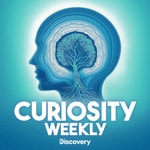Genetics Unzipped – Details, episodes & analysis
Podcast details
Technical and general information from the podcast's RSS feed.

Genetics Unzipped
The Genetics Society
Frequency: 1 episode/11d. Total Eps: 167

Recent rankings
Latest chart positions across Apple Podcasts and Spotify rankings.
Apple Podcasts
🇨🇦 Canada - lifeSciences
03/08/2025#63🇬🇧 Great Britain - lifeSciences
03/08/2025#54🇺🇸 USA - lifeSciences
03/08/2025#63🇨🇦 Canada - lifeSciences
02/08/2025#53🇬🇧 Great Britain - lifeSciences
02/08/2025#43🇺🇸 USA - lifeSciences
02/08/2025#72🇨🇦 Canada - lifeSciences
01/08/2025#42🇬🇧 Great Britain - lifeSciences
01/08/2025#88🇺🇸 USA - lifeSciences
01/08/2025#96🇨🇦 Canada - lifeSciences
31/07/2025#28
Spotify
No recent rankings available
Shared links between episodes and podcasts
Links found in episode descriptions and other podcasts that share them.
See all- http://genetics.org.uk/
114 shares
- https://geneticsunzipped.com/
66 shares
- https://twitter.com/geneticsunzip
130 shares
- https://twitter.com/Kevin_Fong
3 shares
RSS feed quality and score
Technical evaluation of the podcast's RSS feed quality and structure.
See allScore global : 59%
Publication history
Monthly episode publishing history over the past years.
S6.27: Next Generation Sequence: Forging new paths in genetics
Season 6 · Episode 27
jeudi 25 janvier 2024 • Duration 37:30
Please fill out our listener survey at geneticsunzipped.com/survey before January 31st
This episode is all about the next generation, as we meet three up-and-coming scientists who have been supported by the Genetics Society, and learn all about Bermuda skinks, the Black Death and life after a genetics PhD.
Full show notes, transcript and references online at GeneticsUnzipped.com
Follow us on Twitter @GeneticsUnzip
This episode of Genetics Unzipped was written, presented and produced by Sally Le Page with audio production by Emma Werner.
This podcast is created by First Create the Media for the Genetics Society - one of the oldest learned societies dedicated to promoting research, training, teaching and public engagement in all areas of genetics.
S6.26: The battle for biology: How Mendel came to rule the world
Season 6 · Episode 26
jeudi 11 janvier 2024 • Duration 42:54
Please take a minute or two to fill out our listener survey and help shape the future of the podcast: https://geneticsunzipped.com/survey
In this episode, we talk to Greg Radick from the University of Leeds to explore the impact that Gregor Mendel and his populariser William Bateson have had on the past century of genetics, and ask whether there could have been a more Weldonian view of the world.
Full show notes, transcript and references online at GeneticsUnzipped.com
Follow us on Twitter @GeneticsUnzip
This episode of Genetics Unzipped was written and presented and produced by Kat Arney with audio production by Emma Werner.
This podcast is produced by First Create the Media for the Genetics Society - one of the oldest learned societies dedicated to promoting research, training, teaching and public engagement in all areas of genetics.
S6.18: An Evolutionary Revolutionary: Alfred Russel Wallace and the discovery of natural selection
Season 6 · Episode 18
jeudi 7 septembre 2023 • Duration 31:51
We’re exploring the epic life of Alfred Russel Wallace; adventurer, naturalist and co-discoverer of natural selection. Biologist and author, Jim Costa, recounts the life of this often forgotten founding father of evolution.
Full show notes, transcript and references online at GeneticsUnzipped.com
Follow us on Twitter @GeneticsUnzip
This episode of Genetics Unzipped was written, presented and produced by Emma Werner and Sally Le Page.
This podcast is created by First Create the Media for the Genetics Society - one of the oldest learned societies dedicated to promoting research, training, teaching and public engagement in all areas of genetics.
S3.23 Heat, Stick, Duplicate, Repeat: The Story Of The Polymerase Chain Reaction (PCR)
Season 3 · Episode 23
jeudi 5 novembre 2020 • Duration 30:01
Anyone who has worked with DNA in the laboratory is undoubtedly familiar with the polymerase chain reaction - PCR, as it’s usually known.
Invented in 1985, PCR is an indispensable molecular biology tool that can replicate any stretch of DNA, copying it billions of times in a matter of hours, providing enough DNA to use in sequencing or further research, or for applications like forensics, genetic testing, ancient DNA analysis or medical diagnostics.
It’s hard to overstate the transformation that PCR brought to the world of molecular biology and biomedical research. Suddenly, researchers could amplify and study DNA in a way that had been simply impossible before, kickstarting the genetic revolution that’s still going strong today.
So where did this revolutionary technology come from? Officially, PCR was invented in 1985 by a colourful character called Kary Mullis, who won a Nobel Prize for the discovery (more on him later). But, as we’ll see, all the components of PCR were in place by the early 1980s - it just took a creative leap to assemble them into one blockbusting technique.
Listen to the full episode and find a transcript at GeneticsUnzipped.com.
Genetics Unzipped is the podcast from the UK Genetics Society and is produced by First Create the Media. Follow Genetics Unzipped @geneticsunzip, and the Genetics Society @GenSocUK on Twitter.
Listen to Genetics Unzipped on Apple podcasts (iTunes), Spotify, or wherever you get your podcasts.
Genetics Shambles 9: The ethics of genetics
jeudi 29 octobre 2020 • Duration 53:10
Whenever the topic of genetics is mentioned this is always a question of ethics not far behind. Whether that is in Stem Cell research, genetic modification or even basic healthcare.
In this show Robin chats to two experts in the field. Dr Sarah Chan is Chancellor’s Fellow in Ethics and Science Communicator in The Usher Institute at the University of Edinburgh. Professor Anna Middleton leads the Society and Ethics Research Group in Connecting Science. She is also Professor/Affiliate Lecturer at Faculty of Education, University of Cambridge.
To view previous episodes in the Genetics Shambles series head to Cosmicshambles.com
Follow us on Twitter @GeneticsUnzip
S3.22 The Past, Present and Future of the Human Genome Project
Season 3 · Episode 22
jeudi 22 octobre 2020 • Duration 30:34
Thirty years ago this month saw the birth of one of the most audacious research programmes in biology: The Human Genome Project, an ambitious plan to read the DNA sequence of the entire human genome. Ten years later, in June 2000 - after billions of dollars, countless hours of DNA sequencing, and a huge amount of effort from an international collaboration from 20 institutions in six countries - the first draft of the Human Genome was unveiled.
Dr Eric Green has seen the Human Genome Project through from its inception through to the published sequence and into what’s now the fully-fledged field of human genomics. Today, he’s the director of the US National Human Genome Research Institute, and a leading light in the world of genes, genomes and genome sequencing. I called him up to chat about the past, present and future of the human genome - starting by going all the way back to the beginning of the Human Genome Project.
Full show notes, transcript, music credits and references online at GeneticsUnzipped.com.
Follow us on Twitter @GeneticsUnzip
Genetics Unzipped is written and presented by Kat Arney with audio production by Hannah Varrall.
This podcast is produced by First Create the Media for the Genetics Society - one of the oldest learned societies in the world dedicated to supporting and promoting the research, teaching and application of genetics.
Genetics Shambles 8: New genetic technologies
jeudi 15 octobre 2020 • Duration 50:35
Genetic technologies are improving all the time. Not just in sequencing, but in ways that improve our lives. From better crops to curing diseases. And, by pure chance, just hours before we went live with this show it was announced that Emmanuelle Charpentier and Jennifer Doudna had won the 2020 Nobel Prize for chemistry for their work with CRISPR and the technology of genome editing.
Robin Ince chats to two experts in the field. Professor Alison Bentley leads the National Institute of Agricultural Biology’s genetics and breeding department within Cambridge Crop Research and Dr Tony Nolan is a molecular biologist at the Liverpool School of Tropical Medicine working with Target Malaria.
S321 From Philadelphia to Baltimore: Tales of Chromosomes, Cancer Cells and Henrietta Lacks
Season 3 · Episode 21
jeudi 8 octobre 2020 • Duration 33:20
In this episode we’re taking a road trip from Philadelphia to Baltimore, exploring stories of chromosomal cut-and-paste, cancer cures and Henrietta Lacks’ incredible cancer cells.
Studying human cells in the lab allows us to understand more about how they work, investigate the causes of disease, and design new treatments. But growing cells in the lab isn’t as easy as you might think. We explore the story of how Henrietta Lacks’s immortal cells (known today as HeLa cells) became the go-to human cell line for biomedical research, and the impact they’ve had as a result.
We also tell the story of the ‘Philadelphia chromosome’ (a key cause of chronic myeloid leukaemia), how it was discovered and how it’s discovery influenced the search for a cure.
Full show notes, transcript, music credits and references online at GeneticsUnzipped.com.
Follow us on Twitter @GeneticsUnzip
Genetics Unzipped is written and presented by Kat Arney with audio production by Hannah Varrall.
This podcast is produced by First Create the Media for the Genetics Society - one of the oldest learned societies in the world dedicated to supporting and promoting the research, teaching and application of genetics.
Genetics Shambles 7: COVID expert panel 3
jeudi 1 octobre 2020 • Duration 01:16:24
Every couple of months we gather a new panel of experts for a Q&A on where things are at with our current understanding of the ongoing COVID-19 pandemic. With so much misinformation out there it’s important that you, the public and viewers, get a change to ask a panel of experts directly and unfiltered.
For this, volume 3 of our COVID-19 Q&As Robin is joined by three experts. Dr Emma Hodcroft is a researcher at the University of Basel in Switzerland working on sequencing and builds of SARS-CoV-2. Dan Davis is a Professor of Immunology at the University of Manchester and the best selling author of The Beautiful Cure. And Dr Nisreen Alwan is an epidemiologist and Associate Professor of Public Health at the University of Southampton.
To view previous episodes in the Genetics Shambles series head to Cosmicshambles.com
Follow us on Twitter @GeneticsUnzip
S3.20 The Future of Cancer: How Genomics is Transforming Research and Treatment for All
Season 3 · Episode 20
jeudi 24 septembre 2020 • Duration 45:07
In this episode, sponsored by Thermo Fisher Scientific, we’re taking a look at how genomic technologies are transforming cancer care - now and in the future, and the importance of making sure that these advances are available to all.
With:
- Greg Simon, past president of the Biden Cancer Initiative and former executive director of the White House Cancer Moonshot Task Force.
- Jim Downing - president and CEO of St Jude Children’s Research Hospital
- Dr Marianne Grantham, Head of Cytogenetics and Molecular Haematology department at the Royal London Hospital
- Kim Wood, Thermo Fisher Scientific’s Clinical Sequencing Division
Full show notes, transcript, music credits and references online at GeneticsUnzipped.com.
Follow us on Twitter @GeneticsUnzip
Genetics Unzipped is written and presented by Kat Arney with audio production by Hannah Varrall.
This podcast is produced by First Create the Media for the Genetics Society - one of the oldest learned societies in the world dedicated to supporting and promoting the research, teaching and application of genetics.









